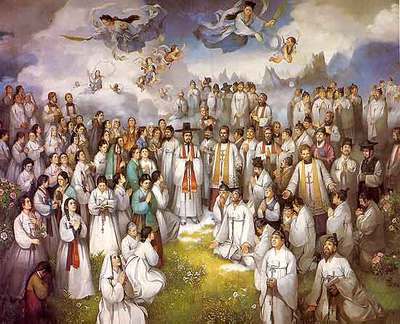
The souls of the just are in the hand of God, and no torment shall touch them. They seemed, in the view of the foolish, to be dead; and their passing away was thought an affliction and their going forth from us, utter destruction. But they are in peace. - Wisdom 3: 1-3
All Saint's Day began in the early years of Catholicism as a way to remember those who died for their faith. It is a day to pray for guidance from the saints and to thank them for showing us how to live more reverent lives. It was not until the twelfth century that November 1st became the feast day of All Saint's.
While we have knowledge of many saints, and we honor them on specific days, there are many unknown or unsung saints, who may have been forgotten, or never given much honor to begin with.
On All Saints Day, we celebrate these saints of the Lord, and ask for their prayers and intercessions. The whole concept of All Saints Day is tied in with the concept of the Communion of Saints. This is the belief that all of God's people, on heaven, earth, and in the state of purification (called Purgatory in the West), are connected in a communion. In other words, Catholic and Orthodox Christians believe that the saints of God are just as alive as you and I, and are constantly interceding on our behalf. Remember, our connection with the saints in heaven is one grounded in a tight-knit communion. The saints are not divine, nor omnipresent or omniscient. However, because of our communion through Jesus Christ, our prayers are joined with the heavenly community of Christians.
There are thousands of canonized saints, that is those individuals officially recognized by the Church as holy men and women worthy of imitation. Because miracles have been associated with these people, and their lives have been fully examined and found holy by the Church, we can be assured they are prime examples of holiness, and powerful intercessors before God on our behalf. There are also many patron saints, guardians or protectors of different areas and states of life. For instance, St. Vitus is the patron saint against oversleeping, and St. Joseph of Cupertino is the patron saint of air travelers. It may sound crazy to have a patron saint against oversleeping, but keep in mind the Church has something meaningful for every area of our human lives. All of these saints are celebrated throughout the year, as many have their own feast days (for instance, St. Hilary of Poitiers, whose feast day is celebrated January 13).
The English word "saint" derives from the Latin sanctus, which means "holy."
God declares everyone who has been baptized and believes the promise of the gospel to be justified, holy, and blameless. The communion of saints therefore includes both those still living on earth and those who have died in the faith and are now living in heaven.
Lutherans do not pray to the saints in heaven or invoke their help as Roman Catholics and Eastern Orthodox do. However, we do honor the saints. Philip Melanchthon, Martin Luther's coworker in the Reformation, wrote of three ways that Christians should honor the saints: The first is thanksgiving. For we ought to give thanks to God because He has shown examples of mercy… because He has given teachers or other gifts to the church… The second service is thestrengthening of our faith; when we see the denial forgiven Peter, we also are encouraged to believe the more that grace truly super-abounds over sin, (Romans 5:20). The third honor is the imitation, first, of faith, then of the other virtues…
When we honor the saints we actually give the glory to God and not to the saints themselves. All the saints who now live in heaven were in their earthly lives exactly like us: poor, miserable sinners and completely unworthy of God's favor. It is only grace -- the Lord's undeserved mercy, love, and forgiveness -- that makes the saints what they are.
The color for All Saints' Day is white. As the Book of Revelation testifies, God's saints are those who have …washed their robes and made them white in the blood of the Lamb. (Revelation 7:14).
All Saints' Day is a very special festival, one that enriches the worship lives of all who observe it. It is a day on which we are edified by the lives of the saints of ancient times. We recall men and women of the Bible like Abraham, Sarah, Moses, Deborah, Ruth, David, Elijah, Peter, and Paul (among dozens of others), and praise God for their examples.
In addition to the saints of Scripture, the church's nearly 2,000-year history is full of the stories of faithful Christians, some well known (like Augustine or Luther), but the great majority known only to God.
We commemorate these holy ones as well. However, we also remember the saints of the less distant past. Many congregations memorialize those parishioners who were called to be with the Lord in recent years, particularly in the last year. An All Saints' Day worship service can therefore be an especially personal celebration as each one of us recalls the loved ones, friends, and mentors now living in heaven whose Christian faith inspired us and gave us joy.
Finally and most importantly, on this day we glorify God not just for the faithfulness of the saints, but for His faithfulness to the saints. All Saints' Day can be seen as the summation of the great church festivals and seasons of Advent, Christmas, Epiphany, Lent, Holy Week, Easter and Pentecost because it reminds us that it is only by the perfect life and saving death of Jesus Christ that Christians are made saints in the sight of the God.
No comments:
Post a Comment